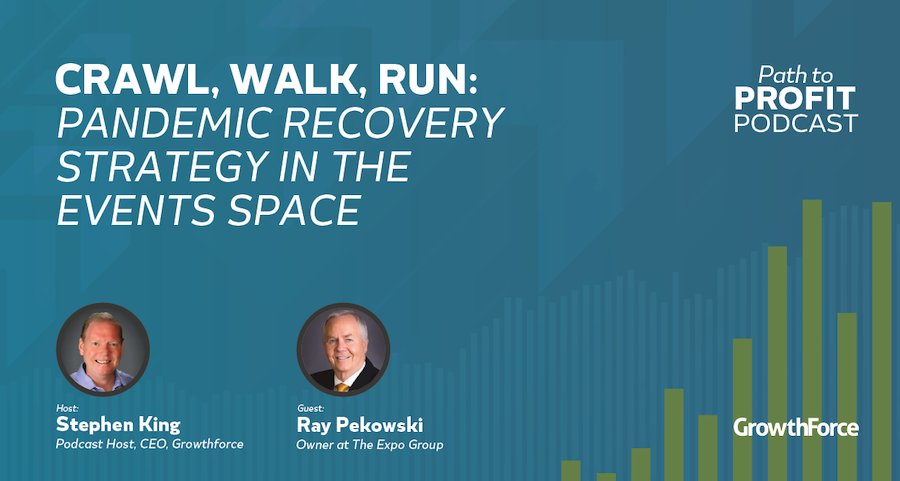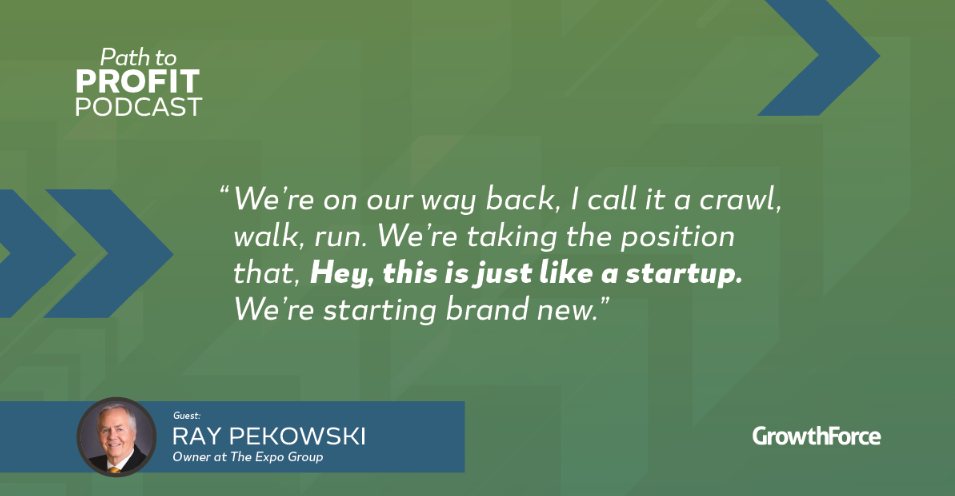6 min read

No matter what size your organization is, all leaders - from seasoned business owners to new entrepreneurs- can find benefits from a ‘start-up’ mindset.
|
Key Takeaways
|
Now, put yourself in this scenario- you were running a 30-year-old convention logistics company with $100 million in revenue and 250 employees. You just completed an acquisition and were getting ready to integrate the businesses when the pandemic hit, postponing all large events, driving your revenue down to $20 million, forcing you to shrink your staff to just 38 individuals (most of whom are only receiving 25% of their normal salaries).
How would you survive? Would you expect, one year later, to have recovered to $45 million and roughly 150 employees?
Well, that's the story of Ray Pekowski, owner of The Expo Group, and recent guest on our podcast, Path to Profit. Ray spoke with GrowthForce CEO, Stephen King about how he shifted the focus of his 30-year-old company from exit planning to COVID recovery planning by operating with a startup mindset.
Adopting a Startup Mindset to Recover From an 80% Pandemic-Related Revenue Loss
Prior to the pandemic, Pekowski's primary focus in his primarily family-operated business was to begin integrating his company with another that they had recently acquired while also preparing The Expo Group for his eventual exit, selecting, training, and instating the next generation of leaders.
Then the pandemic hit, throwing his company like so many others into utter chaos. They survived the most significant periods of shutdown by shrinking their labor force to fewer than 40 employees, instating significant pay cuts on the remaining salaries, and doing their best to stay afloat and keep an eye on a plan for reopening, a reopening that kept getting pushed further and further into an increasingly murky future.
Refering to finding a path through and out of the pandemic, Pekowski said, "We're on our way back. I call it a crawl, walk, run. We're taking the position that, hey, this is just like as startup. We're starting brand new."
And that's exactly what The Expo Group has done.
Like a startup, Pekowski managed to find funding using creative sources, including bringing in a new investor for a significant cash injection in addition to taking advantage of the business tax credits offered by the government to keep as many people employed as possible.
Read More: Cost Analysis: Outsourcing vs. In-House Accounting for Your Business
Similar to a startup, the company is looking to operate as leanly as possible through digitization and automation that's designed to maximize the efficiency of their logistic planning processes to cut costs and time wasted as a result of poor planning whenever possible. Additionally, their proprietary software allows their employees to check in on processes from anywhere – whether they're working in one of the offices or from home. As a result, they've minimized miscommunications and general snafus with respect to their event organizing and planning operations.
Another popular overhead reduction strategy of startups is outsourcing, and Pekowski's company hasn't overlooked the benefits of moving certain business functions outside of their company. They're looking to outsource non-core business functions wherever it is possible to do so without compromising the company's value proposition. For example, they're exploring strategies such as outsourcing accounting and even outsourcing services like providing carpeting for major events.
The Importance of Focusing on Culture and Employee Retention During Rapid Business Growth
As a family business, culture has always been important to Pekowski. "Culture was very important to me from the beginning," he said. "People spend the majority of their lives at work. They don't spend it at home; they spend it at work, and so we become an extension of their family, and we try to look at it that way."
Pekowski continued to explain that their company has always strived toward creating and acting with a servant leadership mentality that inspires them to serve with a purpose greater than themselves, "whether that be God, country, or the company."

He explains that servant leadership means viewing your employees as whole people, seeing the value in them, and providing them with a positive, supportive workplace that sees them through life and all its trials and tribulations – because, as Pekowski put it, they aim to hire for life.
With the high cost of turnover and the direct correlation between employee turnover rates and profits, holding onto employees for life is a truly commendable and business-savvy goal.
Read More: Turnover Surge: Investing In Your Employees Pays Off
Although culture has always been an important focus for Pekowski, he recognizes that maintaining that positive workplace culture during these turbulent times is more important than ever. The company has implemented new policies and processes to help support the company culture and their employees, as they re-grow rapidly, return to the process of integrating their people and systems with those of the newly acquired company, and as they continue to re-hire employees in waves of about 20 people at a time.
Some employees (about 19 so far) are returning to Pekowski's company, others belong to the acquired company, and even more are joining for the first time. With new systems in place and everyone working at different speeds, Pekowski has recognized the need for introductions and intensive training programs, like those that might be implemented in a rapidly growing startup.
As more waves of new hires join the business, these training and culture processes are intended to bring everyone up to speed and get everyone acquainted, including those who might be working from home or on different sides of the country.
Ultimately, the goal is to return The Expo Group back to its pre-pandemic operating levels while continuing to grow the business.
Creative and Attractive Employee Benefit Plans
Just as startups must operate with creativity and agility to attract high quality employees, The Expo Group has devised an attractive benefit plan in which they're offering stock appreciation rights (SARs) also called phantom stocks in a variety of different plans.
This type of benefits option enables the business to reward high-level employees while also giving them a higher stake in the success of the company without giving actual stock. With SARs options, employees benefit from profits the way they would as stock holders, but they don't actually own equity in the company.
On the Path to Post-Pandemic Recovery
The pandemic left no business untouched, especially those operating in industries such as events logistics. While no business owner was prepared to face the challenges of the pandemic, Pekowski has helped his business survive and start to bounce back by quickly pivoting from the mindset of the owner of a 30-year-old business to that of an entrepreneur at the helm of a brand-new business.
When King asked him how he was doing, Pekowski responded simply, "I'm doing great. It's good to be here. It's good to be working."
And isn't that the truth?




